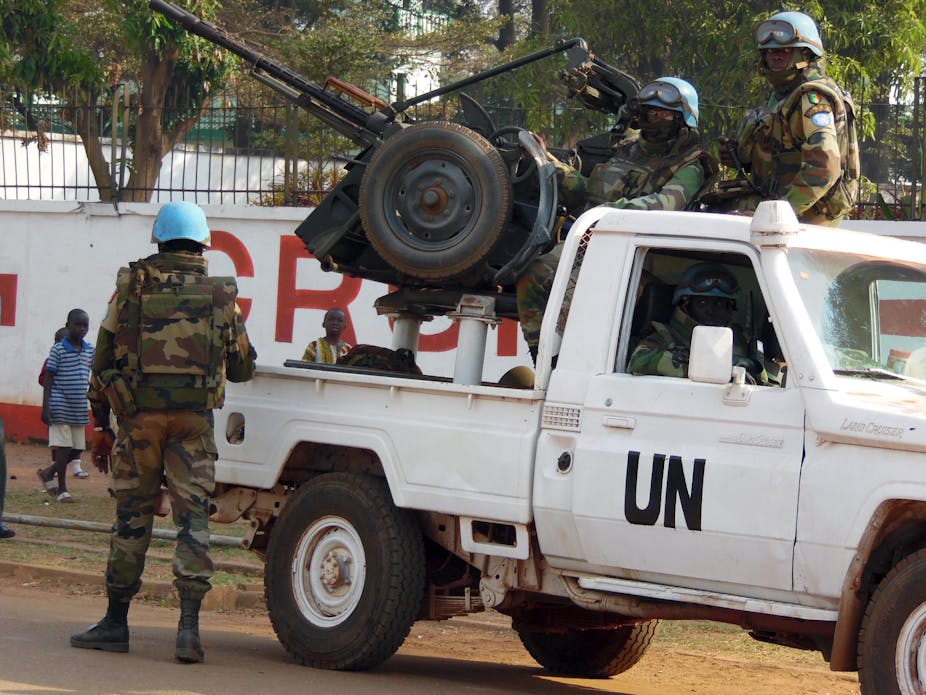The fact that recent allegations of sexual abuse of four young girls in the Central African Republic by United Nations peacekeepers were not more widely publicised suggests, perhaps, the frequency of such allegations.
Sexual exploitation and abuse within UN peacekeeping missions is certainly nothing new: a 1992 report shows that soldiers attached to the United Nations Operation in Mozambique recruited girls aged 12-18 years into prostitution.
The report also found that in half of the 12 country studies conducted on child sexual exploitation and abuse in situations of armed conflict, the arrival of peacekeeping troops was associated with a rapid rise in child prostitution. Almost 25 years later, the UN Secretary-General still refers to it as
a cancer in the [UN] system.
So is the UN unable to tackle this heinous practice, or simply unwilling? Perhaps it is both.
Where responsibility lies
UN peacekeepers are not - despite their name - employed directly by the UN but rather are members of their own national services seconded to work with the UN. This has important legal consequences.
Civilian staff of peacekeeping missions, who are also drawn from contributing countries, are liable to prosecution by the host state; military peacekeepers are not. Under article 47(b) of the Model Status of Forces Agreement, countries that contribute soldiers to UN missions have the responsibility to investigate and prosecute criminal conduct by their own soldiers. This document is used, with necessary modifications, as the basis for all peacekeeping operations.
This means that, technically, the UN is powerless to bring about criminal charges against them, despite the fact many of the charges are brought against them: 37 of the 61 sexual abuse allegations made in 2015 were against military personnel.
It is not difficult, then, to imagine how and why states may be able to avoid potential embarrassment by simply ignoring the allegations. Despite recent improvements, historically member state responses to UN follow-ups on prosecutions of the crimes has been abysmally low.
One solution put forward in a recent UN report calls for the creation of
an international tribunal, created under a treaty between States, with jurisdiction to try UN staff in the field and all categories of peacekeepers.
But we have been here before: in 2002, UN Security Council [resolution 1422](http://www.un.org/en/ga/search/view_doc.asp?symbol=S/RES/1422(2002) granted temporary immunity to peacekeepers from international criminal prosecution at the insistence of the US.
States are not generally willing to give up control over prosecuting their troops, but they also typically seem unwilling to pursue criminal cases themselves. Senior UN mission officials have noted delays in instigating procedures in numerous cases. They saw these as stemming from attempts by contributing countries to avoid sexual exploitation and abuse allegations, and the resulting motivation to exonerate personnel.
Even in cases where individuals were prosecuted and convicted by the contributing countries, the sentences were grossly disproportionate to the severity of their crimes: take the example of two Pakistani men sentenced to a year in prison for the rape of a 14 year old boy.
Whether the culprits are convicted or not, justice for the victims appears to be an illusion.

UN is not absolved
But this inability of the UN to prosecute does not entirely absolve the organisation. The strong condemnations of the sexual crimes by former UN Secretary-General Kofi Annan and current head Ban Ki-Moon’s threats of “naming and shaming” the countries from which the offending troops come from need to be backed up with action, which has been lacking.
The UN as an organisation must do everything in its power to push for prosecution by states.
Despite more than 15 initiatives since 1998 to address sexual crimes committed by peacekeeping troops, a huge shift in attitude is still needed. An investigation recently found that only two-thirds of the sexual exploitation and abuse cases identified by the UN’s Office of Internal Oversight Services in 2013-14 were actually referred to the national authorities that held criminal jurisdiction.
The assertions of whistle-blower Ander Kompass that the Office of the High Commissioner for Human Rights ignored a report detailing rape and sodomy of young boys by French peacekeeping troops in the Central African Republic in 2014 are even more damning. This led to sharp criticism in an independent report.
Shockingly, too, the UN’s Misconduct Tracking System does not extend to peacekeepers.
In short, the UN has no way to vet for past misconduct among peacekeepers, so offenders could potentially return to abuse again. This lack of accountability is a huge loophole that must be closed.
As the body that issues peacekeeper mandates, the UN Security Council must also step forward to set an example. A statement in all relevant resolutions outlining both the expected conduct of peacekeepers and supporting the sanctions outlined by Ban Ki-Moon would present a unified front. So far, the Council’s support of the UN’s Zero Tolerance [policy](http://www.un.org/en/ga/search/view_doc.asp?symbol=S/RES/1983(2011) has been incidental and piecemeal.
A long way to go
The UN certainly appears to have a long way to go if it is to match action to rhetoric. If the problem is to be eliminated, states cannot hide behind excuses of “a few rotten apples” as the price to pay for intervention. As chief of the UN mission in the Central African Republic, MINUSCA, Parfait Onanga-Anyanga noted,
[it] is absolutely unacceptable for even a single peacekeeping soldier to be involved in these awful acts.
Unfortunately, without serious overhaul of the peacekeeper system, the door remains open to sexual abuse by peacekeepers with a propensity for it: the risk of being punished by the UN or back home is simply too low.

